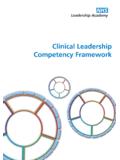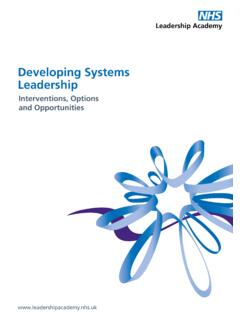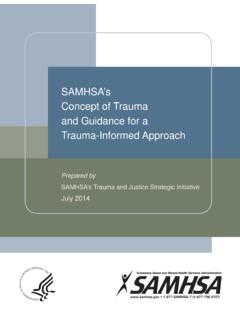Transcription of The Healthy NHS Board Principles for Good Governance
1 The Healthy NHS Board Principles for good GovernanceForewordThe Healthy NHS BoardWe are delighted to introduce The Healthy NHS Board : Principles for good Governance , and would like to encourage boards across the system to make use of this guide as they seek to address the challenges of improving quality for National Leadership Council (NLC) has led this work to bring the latest research, evidence and thinking Quality Care For All made it clear what the NHS is here to do to improve the health of our population and to make quality the organising principle of the must put quality at the heart of all they do. This guide, and the online resources that accompany it, support boards in exercising that responsibility. When we talk about quality, we mean patient safety, effectiveness of care and patient experience.
2 Assuring these three elements of quality for patients should be central to the work of everyone in the NHS is putting in place levers and incentives to improve quality, including linking the payment system more closely with patients experiences, as well as strengthening the regulatory system to safeguard quality and safety. As these changes take shape, it is timely to refresh guidance to NHS boards to support them as they go a system as large and complex as the NHS, it is helpful to have a common understanding of what we mean by good Governance and what it takes to be a high-performing NHS has had a decade of growth but is facing the challenge of managing with less in the future. Boards are being asked to improve quality on the one hand, while controlling their resources on the international and national evidence demonstrates it is perfectly possible to improve quality and productivity at the same time.
3 It is a lesson much of the rest of the global economy has already document has been prepared for the NHS National Leadership Councilby partnership with 3 The key is to drive improvements in quality and productivity through a relentless focus on innovation and prevention. In 2009, the NHS was set the challenge of releasing efficiency savings in the order of 15 - 20 billion by the end of 2013/14, to reinvest in year-on-year improvements in must focus on looking after quality, and expect resources to fall out of that process, not the other way the NHS has failed patients on quality, too often a dysfunctional Board has focused in the wrong areas and without the appropriate Governance arrangements in place to improve quality for this guide does set out processes and systems to support good Governance , the main focus is on the importance of building an open and honest organisational culture.
4 Checklists have their place, but good Governance results from grounded debate and good boards don t build walls around themselves. They look out to their patients, to their communities and to their partners, and build strong relationships. In future, we expect Boards to play their part in shaping how partners and other organisations are working together, particularly around patient are facing difficult questions around prioritising, rationalising, service reconfiguration and potential mergers and acquisitions. Identifying and promoting the interests of patients and the public must drive this work - not re-organising as a knee-jerk the past, we have seen how cuts to services have impacted on patients, who have borne the brunt of poor planning and decision-making. As we move into leaner times, the NHS is committed to protecting the interests of patients.
5 This is enshrined in the NHS Constitution, which all NHS organisations are legally obliged to take account of. Boards have the ultimate responsibility to keep that commitment to their would like to thank everyone who has contributed to this work. More than 1,000 people have been involved, including Board members, NHS staff, the Steering Group, the Appointments Commission, the NHS Confederation and David Nicholson KCB CBE Elisabeth Buggins CBEC hair, National Leadership Council NLC Board Development Lead45 ContentsForeword ..31 Introduction ..6 Purpose of this guidance ..6 How to use the document ..62 Purpose and role of NHS boards ..8 Roles of the Board ..10 Formulate strategy ..10 Ensure accountability ..11 Shape culture ..14 Building blocks ..16 Context ..16 Intelligence ..17 Engagement.
6 203 System Governance the Board s role ..22 Operating constructively in the health and social care system ..22 Effective Governance of formal partnerships ..234 Improving Board effectiveness ..26 Building capacity and capability ..26 Enabling corporate accountability and good social processes ..29 Embedding Board disciplines ..30 Delegating appropriately ..31 Exercising judgment ..325 Roles of Board members ..36 Roles of Board members ..36 Board members roles in building capacity and capability ..38 Chair and chief executive roles and relationship ..38 Non-executive directors time commitment ..39 Role of the company secretary ..39 Appendix 1: Perspectives on Governance ..40 Appendix 2: Acknowledgements ..41 References ..426 Purpose of this guidance1 This document sets out the guiding Principles that will allow NHS Board members to understand the: Collective role of the Board .
7 Governance role within the wider health system. Activities and approaches that are most likely to improve Board effectiveness. Contribution expected of them as individual Board It is hoped that NHS Board members will find this guidance valuable and will focus effort in ways that the evidence suggests should be most productive. 3 This guidance is intended for boards of all NHS organisations. Some interpretation will be required for organisations operating at a national or regional level. 4 This guidance will also be of interest to those aspiring to be NHS Board members, to governors of Foundation Trusts and to those who support and work with NHS to use the document5 This document describes the enduring Principles of high quality Governance , which transcend immediate policy imperatives and the more pressing features of the current health care environment.
8 6 Alongside this statement of Principles , a regularly updated digital compendium sets the Principles in the context of the current policy and organisational landscape. It describes recent developments and offers up to date case studies with examples to help Board members put the Principles into practice. The compendium is accessible at 7 The material in the compendium is complemented by a range of practical resources to support Board effectiveness. These resources are available for download. Regular contributions of new tools, approaches, case studies and good practice from the service will be actively sought to ensure that this collection of resources remains current and relevant. This is represented in Figure 1. If you find a resource that merits inclusion please send a copy or a link to This document can be used by Board members as an introduction to the subject of Governance in the NHS.
9 Since it is designed to be enduring, it can be kept as a reference a first place to turn in the future. The compendium should be consulted when more detail is needed on specific issues, or to understand details of underlying guidance and The development of this guide and its accompanying resources was underpinned by a comprehensive review of Governance literature and an extensive process of engagement with the NHS. In all, some 1,000 NHS staff and Board members took part in this consultation, and the shape and content of the guide reflect their contributions. In addition, the literature review, entitled The Healthy NHS Board : a review of guidance and research evidence , considered over 140 sources; it is available for download at 1 IntroductionThis chapter explains the purpose of this Principles guidance and provides a visual summary to help readers navigate through the document.
10 It also describes the online resources that accompany it. The Healthy NHS Board Principles for good Governance | 1 Introduction7Th e Healthy NHS Board PrinciplesThe Healthy NHS BoardPrinciples for good GovernanceOnline Updated regularlyOnline resourcesLiterature Review, Case Studies, Policy and Guidance, Tools etcUpdated regularlyTTTThhhHHllhhSddhhhee H Healthy NHS Board PrinciplesFigure 1: Structure of this guidance810 The purpose of NHS boards is to govern effectively and in doing so to build public and stakeholder confidence that their health and healthcare is in safe hands. This fundamental accountability to the public and stakeholders is delivered by building confidence: In the quality and safety of health services. That resources are invested in a way that delivers optimal health outcomes.










